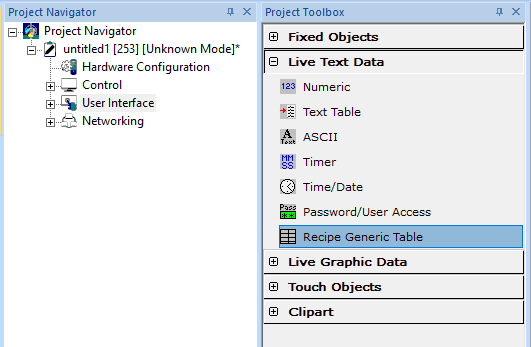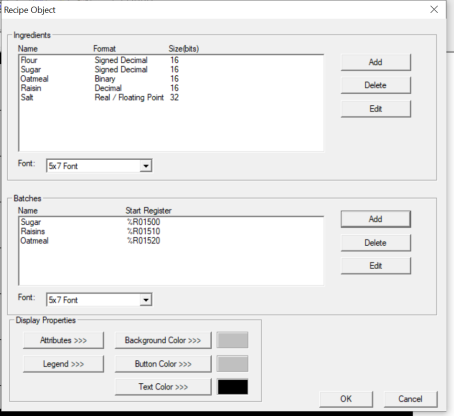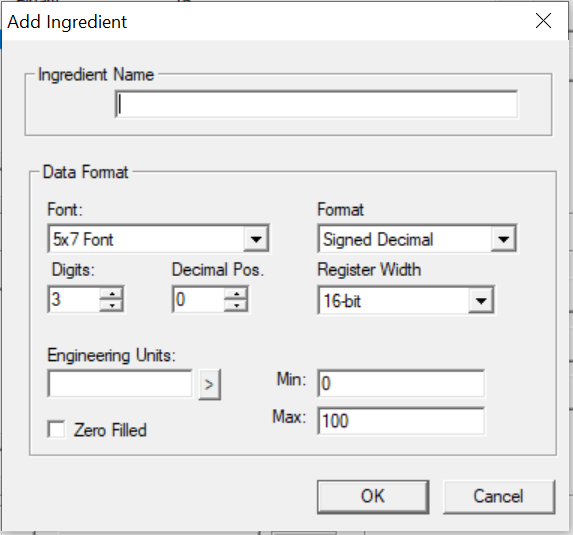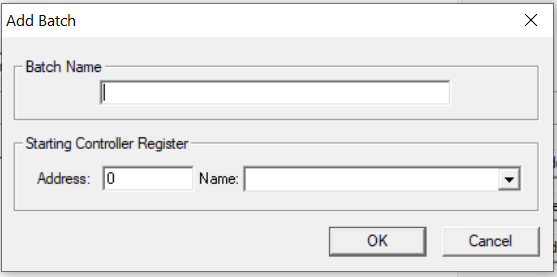Recipe Object 
Note: For Canvas Series see Recipe Editor Configuration for Canvas .
See also: User Interface
See also: Graphic Object Toolbox
Topic Menu

|
How to Develop Recipes |

|
Cscape Recipe Management Part 1 |

|
Cscape Recipe Management Part 2 |
Batch Production Overview
Allows sets of registers to be edited or viewed so that they may then be moved into a main block of registers for use.
This object is used to view and edit several blocks of data used for recipe or batch production. The data is stored in controller registers and can easily be saved or loaded from Removable Media on units that support removable storage. The object is broken down into ingredients and batches. Ingredients are shown as rows with the labels on the far left. Ingredients represent the setpoints for the various items that make a batch. The batches are shown as columns with the labels on the top. Batches represent a group of setpoints.
The Ingredient and Batch text can be displayed in different fonts by changing the ”Font” selection in the appropriate section. This only affects the label and not the actual numeric values. The ”Add”, ”Delete” and ”Edit” buttons can be used for the selected ingredient or batch. Double clicking an ingredient or batch also allows it to be edited.
Can be accessed through the Home > Project Toolbox > Live Text Data > Recipe Generic Table. User must be on a Screen and not in the Main work area in order to see the Objects Project Toolbox items.

Recipe Object

The Ingredient and Batch text can be displayed in different fonts by changing the ”Font” selection in the appropriate section. This only affects the label and not the actual numeric values. The ”Add”, ”Delete” and ”Edit” buttons can be used for the selected ingredient or batch. Double clicking an ingredient or batch also allows it to be edited.
Add Ingredient

When adding or editing an ingredient the above dialog is used. The Ingredient label is displayed to the left of the row of ingredients. This identifies the ingredient the operator is viewing or changing. The data format changes how the numeric data is displayed and entered. These options work in a similar fashion to the numeric data object. The font selected is used to display the numeric value over the entire row for the selected ingredient.
Add Batch

Each batch is defined by a name to display at the top of the column and a starting register for the batch data. Leaving extra space between batches allows new ingredients to be added more easily in the future. Setting up the batch to use consecutive register may make the logic easier for switching batches or using Removable Media.
Register Usage
Registers for each batch start at the location specified in the batch dialog. The ingredients are stored in a sequential manner with a minimum size of 16 bits. In the above dialog, the ”Sugar” batch starts at %R1500. The following table shows the location of each ingredient for each of the three batches.
|
Sugar |
Raisin |
Oatmeal |
|||
|
Flour |
%R1500 |
%R1510 |
%R1520 |
||
|
Sugar |
%R1501 |
%R1511 |
%R1521 |
||
|
Oatmeal |
%R1502 |
%R1512 |
%R1522 |
||
|
Raisin |
%R1503 |
%R1513 |
%R1523 |
||
|
Salt |
%R1505 |
%R1515 |
%R1525 |
Note: Even though Oatmeal is a single bit data field, the next entry starts in the next full register. This format allows block moves or Removable Media operations to easily move a block of data for a batch.
Return to the Top: Recipe Object